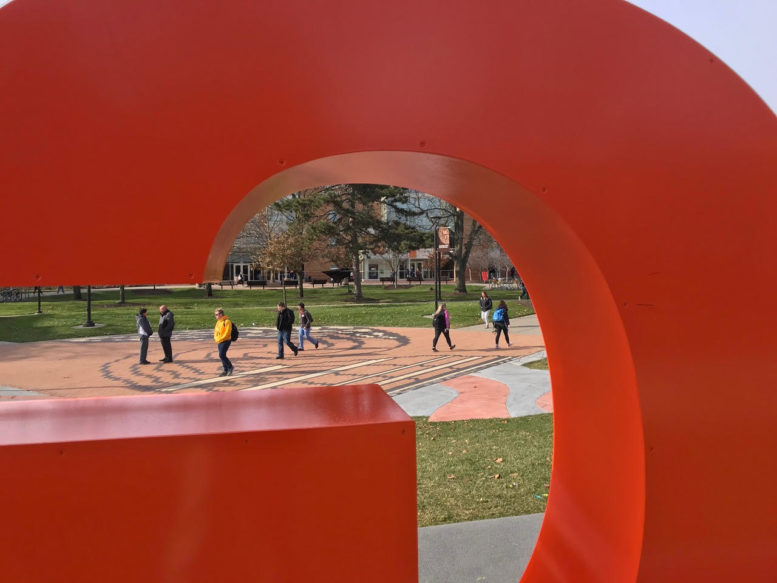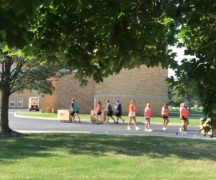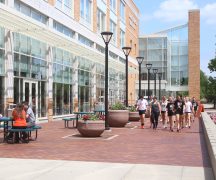By DAVID DUPONT
BG Independent News
More prospective Falcons are expected to roost at BGSU in the fall semester.
At the May BGSU Board of Trustees meeting, Cecilia Castellano, vice president for enrollment management, reported that the number of students coming from high school who have committed to enrolling is up 10 percent from last year. When students from the Pathways program are added that brings the number of students up by 14 percent.
Pathways is a program enrolls students who do not meet the admissions requirements through the BGSU Firelands campus. The Pathways program brings those students to the Bowling Green campus, where they take a designated set of courses taught by Firelands faculty. The program, which started in 2014, is intended to help them successfully transition in bachelor’s degree programs at BGSU. The number of students enrolling at BGSU’s main campus after completing the program is up 53 percent, Castellano said. “That program caught on like wildfire.”
Also, a boon for enrollment is the number of students who entered last fall who have decided to continue at BGSU. She reported the projected retention is 81.7 percent, an increase from 79.6 percent for the previous class.
Marilyn Eisele, in her last meeting chairing the board, congratulated the administration for topping the 80 percent retention mark. “We’ve been working for years to get that above 80 percent mark.”
Retention, along with graduation rates, is a key factor in the amount of money the university receives from the state. In a report to the Financial Affairs committee, Chief Financial Officer Sheri Stoll said that the university received $1.9 million more in state funds because it performed better than other state institutions in those areas.
Reservations for student orientation, which begins next week, are also up 23 percent, Castellano said.
Provost Joe Whitehead said that university staff is working hard to prevent “summer melt,” when students change their minds about going to college during the summer.
This includes working with students who are having financial problems as well as those with academic difficulties.
Graduate school enrollment in up 22 percent as well. That’s been driven, Castellano said, by students enrolled in BGSU’s new doctorate in physical therapy program.
Total number of graduate students is down because the university has yet to replace the 200 online MBA students who graduated a year ago. That program benefited from people taking advantage of the pandemic to further their education remotely.
Castellano said that enrollment is up for all the university’s colleges led by the Schmidthorst College of Business. She specifically credited academic programs in nursing, advanced manufacturing, and aviation with attracting students.
Of those committed to attending BGSU, 85 percent come from with Ohio, and 15 percent come from out of state, especially nearby counties in Michigan. International enrollment is also up, Castellano said, with India, Nepal, and Vietnam especially strong markets.
“It really feels likes the pandemic is behind us,” Castellano said. “I believe we’re on the right track.”
The entering students, she said, also come with stronger academic credentials. The average grade point average of new students nudged upward to 3.66 compared to 3.64 in 2022.
But, as Castellano noted, that means while the university is bringing in more students and their tuition dollars, it is also paying out more on scholarships.
Stoll noted in her financial report to the Financial Affairs Committee, overall head count remains down.
The two small classes brought in during the pandemic are now juniors and seniors.
Stoll said she was “cautiously optimistic” about the university’s finances. Unless the university keeps its guard up, budgetary problems result. “It’s easier to increase than to cut” spending.
The financial picture looks better in May 2023, than it did last summer, Stoll said.
While revenues are increasing so are expenses.
As the university emerges from the pandemic, it has begun to hire.
That includes maintenance and office staff as well as deans. The university filled three dean vacancies in the past year – Jennifer Percival, dean of the Schmidthorst College of Business, Ellen Schendel, dean of the College of Arts and Sciences, and Jennifer Waldron, dean of the Graduate College.
The university has also conducted a number of successful searches for faculty that includes new positions for the physical therapy and nursing programs.
Inflation has taken its toll, she said especially in travel, utilities, and supplies. Software applications have seen increases higher than the rate of inflation, Stoll noted. One company notified the university that it would increase the price for its software by 45% in each of the next three years.
Returns on investments, she said, are critical to balance the budget.
“We’re not going to enrollment grow our way out of this, and we’re not going price increase our way out of this,” she said. “It’s going to require a continued restraint on expenses and continuing to find ways to increase productivity.”
That includes reducing the amount of space it must maintain, such as demolishing the administrative building, she said. “That can help us continue to live within the budget.”





